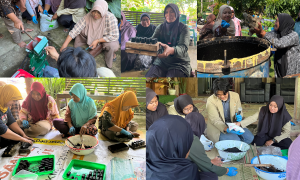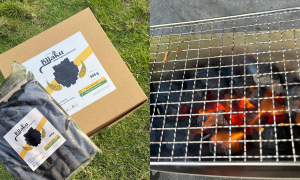
The PKM-PM BIJAK UGM Team, funded by the Ministry of Education, Culture, Research, and Technology (Kemendikbudristek), carried out a program entitled “Empowerment of PKK Kalimundu through Processing of Agricultural Waste Corncobs into Briquettes with Optimization of Caloric Combustion”. This activity aims to empower PKK mothers in Kalimundu Hamlet, Gadingharjo Village, Sanden District, Bantul Regency, by processing agricultural waste into environmentally friendly briquettes that hold economic value, thereby promoting community welfare improvement.
The empowerment activity for PKK mothers in Kalimundu Hamlet involved collaboration between students from various disciplines, namely Anisa Eka Zakiya (EPA 2023), Asyifa Nur Afanie (EPA 2023), and Laluna Lena (EPA 2023), in collaboration with Salma Salsabila (Chemical Engineering 2023) and Muhammad Wildan Mustofa (Plant Protection 2024). The team was supervised by Mrs. Hariyani Dwi Anjani, S.P., M.Sc., Lecturer at the Agricultural Economics and Agribusiness Study Program, Universitas Gadjah Mada (UGM).
The activity was carried out through several stages, starting from socialization, training, and practice, followed by marketing workshops, and concluded with monitoring and evaluation. In the socialization stage, the team introduced the objectives and benefits of the program to the PKK mothers. Furthermore, through production training and practice, the mothers were taught how to process corncob waste into alternative energy sources that are both economically valuable and environmentally friendly. The marketing workshop focused on packaging training and marketing strategies to enhance the products competitiveness in the local market.

Through this series of production and marketing training, the PKK mothers of Kalimundu are expected to be able to turn corncob waste into alternative energy sources while also opening new business opportunities. The activity was closed with monitoring and evaluation, as well as the formation of an organizational structure as a form of program sustainability. This program becomes a tangible form of UGM students’ contribution to women’s empowerment, sustainable waste management, and community welfare improvement.
After carrying out community service activities with the mothers in processing corncob waste into briquettes, the BIJAK team felt deeply moved and proud to see the extraordinary enthusiasm that grew among the PKK mothers.
“After participating in this activity, previously we could not utilize corncobs, after the corn harvest, the cobs were just thrown away. Now we know and can make use of corncobs into briquettes,” explained Lisbi, one of the PKK members who participated in the training.
From materials often considered worthless, creations are born that bring hope and tangible benefits. This experience shows that significant change begins with simple hands that are willing to try and strive. This experience is not only about sharing knowledge, but also about learning—learning to innovate and to believe that every small step toward sustainability is a valuable contribution to a more empowered future.

This program is also closely related to the Sustainable Development Goals (SDGs). Through women’s empowerment (SDG 5: Gender Equality), the increase of local economic productivity (SDG 8: Decent Work and Economic Growth), and the management of agricultural waste into alternative energy (SDG 12: Responsible Consumption and Production and SDG 13: Climate Action), this activity contributes concretely to creating a more empowered, innovative, and sustainability-oriented rural community.
Authors: Anisa Eka Zakiya, Asyifa Nur Afanie, Laluna Lena, Salma Salsabila, and Muhammad Wildan Mustofa (PKM-PM BIJAK UGM Team)
Editor: Aprilia Dwi Hastuti
Admin of the Website for the Agricultural Economics and Agribusiness, Faculty of Agriculture, UGM
